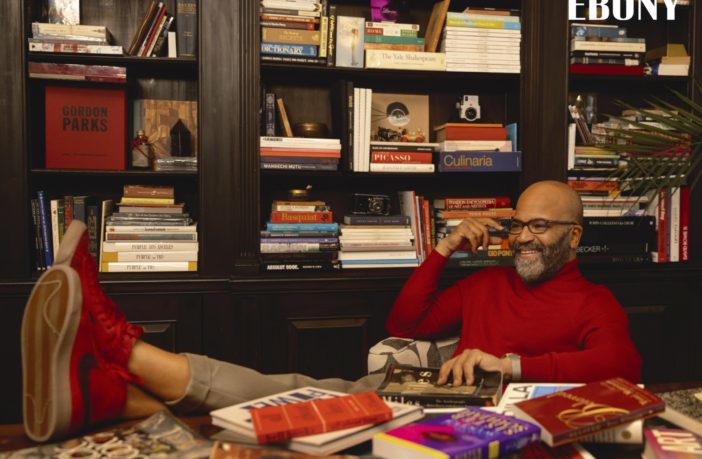Drawing from legendary works by Black creatives, EBONY and Jeffrey Wright pay homage to many cultural pioneers through our February 2024 digital cover experience. Let’s unpack these elements and their significance to Black culture and the wider world.
Du Bois inspo
W. E. B. Dubois in the office of The Crisis. Image: courtesy of Schomburg Center for Research in Black Culture, Photographs and Prints Division/ The New York Public Library.
W.E.B. Du Bois’ philosophy of race forever changed many people’s understanding of society. Du Bois essentially labeled the concept of race itself as fiction (i.e. something we made up) to maintain the status quo of Jim Crow laws. By emulating the iconic photo of Du Bois at his desk, we wanted Wright to call attention to the importance of Black stories and their power to change social consciousness.
A Warrior for Black Expression
Jean-Michel Basquiat, a pioneer of the 1980s New York art scene, remains an icon of Black artistry. The cultural impact of his art continues to transcend societal boundaries. His fusion of street and fine art challenged the artistic conventions of the time, and he used his artistic platform to address themes of identity, racism and social injustice. His powerful artwork sparked nationwide discourse on race, class and the human experience: he is a legendary example of Black creative expression.
Something to read at the barbershop
Since 1945, EBONY has been at the forefront of showcasing Black excellence. The vintage EBONYs displayed on the table signify our decadeslong commitment to celebrating Black culture.
“It was wonderful seeing the old EBONYs and reminiscing on that golden age and appreciating that,” Wright said of the shoot. “EBONY has been there throughout so many amazing and powerful moments in the history of this country and chronicling those critical years of the 20th century that saw so much evolution and emergence for the Black community and America.”
“Remember, care is a dimension of love, but simply giving care does not mean we are loving” – bell hooks, All About Love
In All About Love: New Visions, bell hooks asserts we need to work toward actively loving the people in our lives. Over 13 chapters, hooks dissects the concept of love: what does it mean to love, and where is love lacking in our society? Wright’s latest film, American Fiction, highlights the simultaneous fear and fascination America has for Black Americans. There’s a certain voyeurism of Black style, Black slang and Black culture—maybe the only way to overcome antiblack racism is to love Black people and not just the culture.
What does the mirror reflect back at us?
Black culture is American culture. So often marginalized Americans—rightfully—criticize our country. We suffer many symptoms of a nation born out of violence: things like mass incarceration, a vast regression of women’s rights and threats to our civil rights daily. But in that practice of self-criticism, it is also deeply important to recognize the love rooted in Black (and therefore American) culture. From the way we talk and the way we eat to our art and our inventions, the American way of life would be significantly and fundamentally different without the contributions and innovations of Black people.



